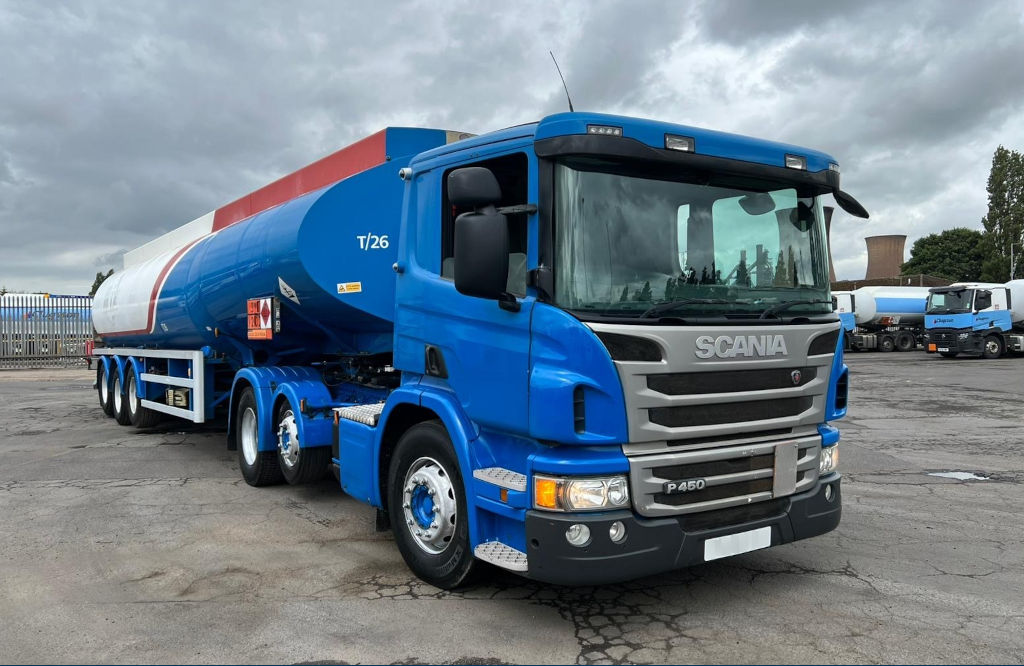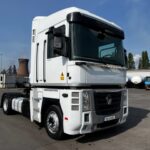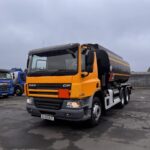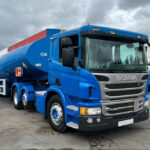

Choosing Between Tractor Units and Rigid Trucks for Your Fleet
In the logistics and transport sector, selecting the right type of used commercial vehicle can make or break the efficiency of your operations. Whether you are managing long-haul deliveries across countries or distributing goods in urban areas, the choice between tractor units and rigid trucks remains important.
Both vehicle types possess unique advantages that cater to various industries and cargo needs. Tractor units excel in long-haul transportation, offering flexibility by allowing the exchange of trailers. On the other hand, rigid trucks are well-suited for urban distribution, providing manoeuvrability in tight spaces and the ability to carry cargo directly on the vehicle’s chassis. Understanding the specific requirements of your operation will guide you in selecting the most appropriate vehicle type to optimise your logistics processes and ensure efficient goods transportation.
Making the right decision not only affects your operational efficiency but also plays a key role in optimising costs and meeting customer expectations.
Tractor Units
Tractor units, commonly referred to as articulated lorries or semi-trucks, are designed for flexibility and efficiency over long distances. These vehicles consist of a powerful cab (tractor unit) that hauls a detachable trailer, allowing for customisation based on the type of goods being transported. While the cab itself lacks cargo space, its strength lies in its ability to pull trailers of varying sizes and functions.
A tractor unit is designed for hauling heavy cargo trailers, thanks to its robust, high-performance engine. One of the key features that enables these trucks to pull massive loads is the fifth wheel, a coupling device mounted above the rear axle.
The fifth wheel provides a secure connection point for attaching a trailer to the tractor unit. Its strategic placement helps to distribute the weight of the cargo evenly between the truck and the trailer. This balanced weight distribution enhances the vehicle’s stability, ensuring safer and more efficient transportation of heavy goods.
Moreover, the tractor unit’s sturdy chassis and advanced suspension system work in harmony with the fifth wheel to maintain optimal control and manoeuvrability, even when hauling the heaviest of loads.
Advantages of Tractor Units
- Customisable Trailers: The ability to switch between different trailers allows businesses to diversify their operations without investing in multiple trucks.
- High Payload Capacity: Tractor units are typically built to handle larger loads, making them ideal for transporting bulk goods across countries or continents.
- Easy Maintenance: Since the trailer can be disconnected from the cab, maintenance is more straightforward, and downtime can be reduced by swapping out trailers if repairs are needed.
Common Applications of Tractor Units
- Intercontinental Freight: Tractor units excel in transporting large volumes of goods across long distances, making them a staple in international shipping.
- Heavy-Duty Cargo: From machinery to bulk materials, tractor units are well-suited for industries such as construction and manufacturing.
- Container Transport: Commonly used in port logistics, tractor units efficiently move containers between shipping docks and distribution centres.
Axle Configurations for Tractor Units
The performance and efficiency of a tractor unit can vary significantly based on its axle configuration. Choosing the right configuration will depend on factors like road conditions, payload requirements, and legal restrictions.
- 4×2 Configuration:
- Setup: One front steering axle and one rear drive axle.
- Use: Ideal for lighter loads and long-haul journeys on motorways, offering reduced rolling resistance and better fuel economy.
- 6×2 Configuration:
- Setup: One front steering axle, one rear drive axle, and a non-driven mid-lift or tag axle.
- Use: Balances payload capacity and fuel efficiency. The liftable axle helps reduce tyre wear and fuel consumption when not fully loaded.
- 6×4 Configuration:
- Setup: One front steering axle and two rear drive axles.
- Use: Designed for heavy loads and off-road conditions, such as construction sites or unpaved roads, providing improved traction and stability.
Rigid Trucks
Rigid trucks, also known as straight trucks, have both the driver’s cabin and cargo area built on a single chassis. While they lack the customisation options of tractor units, their compact size and manoeuvrability make them ideal for urban deliveries and shorter distances.
Advantages of Rigid Trucks
- Easier to Manoeuvre: Due to their smaller size and fixed body, rigid trucks can navigate narrow streets, tight corners, and congested city centres with ease.
- Cost-Effective for Short Routes: With lower operating costs and fuel consumption over short distances, rigid trucks are often the preferred choice for local deliveries.
- Variety of Body Types: Rigid trucks come in different configurations tailored to specific transport needs, from refrigerated compartments for perishable goods to flatbeds for construction materials.
Common Applications of Rigid Trucks
- Fuel Delivery: Fuel tanker trucks are essential for transporting petroleum products from refineries and bulk storage facilities to gas stations, ensuring a steady supply of fuel for vehicles.
- Waste Management: Vacuum & jetter tankers are critical in the sanitation industry, used for collecting and transporting liquid waste from septic tanks, grease traps, and industrial sites to treatment facilities.
- Urban Deliveries: Whether it is retail or food deliveries, rigid trucks are ideal for making multiple stops within cities.
- Construction: Tipper and flatbed versions of rigid trucks are frequently used to transport materials to and from construction sites.
- Specialised Cargo: Rigid trucks with box bodies or temperature-controlled compartments are commonly used in industries such as pharmaceuticals, where safety and environmental control are paramount.
Popular Body Types for Rigid Trucks
- Fuel Tanker Trucks: These tankers are designed to transport various petroleum products, such as gasoline, diesel fuel, and kerosene. They are equipped with specialised compartments and pumping systems to ensure safe and efficient delivery.
- Vacuum & Jetter Tankers: Used for transporting and disposing of liquid waste, such as industrial sludge. These tankers are equipped with powerful vacuum pumps and high-pressure water jetting systems for efficient waste removal and cleaning.
- Curtain-side Trucks: Ideal for industries that require frequent loading and unloading, such as retail and logistics. The retractable curtains provide easy access to goods while offering protection from the elements.
- Box Trucks: Enclosed and secure, these trucks are perfect for transporting dry goods, electronics, and valuable items that need protection from weather and theft.
- Refrigerated Trucks: Equipped with insulation and cooling systems, refrigerated trucks are indispensable for transporting perishable goods such as fresh produce, dairy, and pharmaceuticals.
- Tipper Trucks: Commonly used on construction sites, these trucks are designed to transport and unload loose materials like gravel or sand quickly.
- Flatbed Trucks: With an open cargo bed, flatbeds are used for carrying oversized or irregularly shaped cargo, such as machinery or construction materials.
- Concrete Mixer Trucks: Essential for construction projects, these trucks are equipped with a rotating drum that mixes and transports ready-mix concrete to job sites.
Understanding Gross Vehicle Weight (GVW) for Rigid Trucks
Rigid trucks come in various weight categories, with the Gross Vehicle Weight (GVW) determining the maximum permissible weight of the vehicle, including its load. Choosing the right GVW for your business ensures that you meet legal requirements while optimising load capacity.
- 7.5 Tonne Rigid Truck:
- Use: Ideal for lighter loads and urban deliveries, such as courier services or retail distribution.
- Advantages: Lower operational costs and ease of manoeuvrability, particularly in city environments.
- 18 Tonne Rigid Truck:
- Use: Suitable for transporting medium loads across regional distances. Common in industries like agriculture and retail.
- 26 Tonne Rigid Truck:
- Use: Often used in construction and waste management, capable of handling larger, heavier loads.
- Advantages: A good balance between load capacity and fuel efficiency for heavy-duty tasks.
- 32 Tonne Rigid Truck:
- Use: The go-to option for transporting extremely heavy loads, such as industrial equipment or bulk materials, over long distances.
Which Should You Choose
The decision between a tractor unit and a rigid truck depends on your specific business needs.
Here are a few considerations:
- Distance and Route: If your operations involve long-distance or cross-border transport, a tractor unit’s flexibility and fuel efficiency will serve you well. For regional deliveries, particularly in urban environments, rigid trucks offer better manoeuvrability and lower costs.
- Operational Flexibility: Tractor units provide the flexibility of using different trailers, making them more versatile if your business handles a variety of goods. Rigid trucks, however, are purpose-built for specific tasks, offering higher efficiency for niche operations like urban deliveries or construction work.
- Cost Efficiency: If your focus is on cost-saving for short routes and smaller loads, rigid trucks offer better fuel efficiency and lower maintenance costs. For businesses with a wider geographical reach and higher payload requirements, the initial investment in a tractor unit can pay off in reduced transport times and fewer trips.
Buy a Tractor Unit or Rigid Truck from the UK
Both tractor units and rigid trucks bring unique advantages to the table, and your choice should be guided by the demands of your business. Tractor units provide unmatched versatility and capacity for long-haul logistics, while rigid trucks excel in delivering efficiency and manoeuvrability for local and specialised deliveries.
For businesses that require efficient long-distance transportation of liquid cargo, we often have well-maintained Renault tractor units in stock. These powerful vehicles are designed to deliver performance and reliability, making them an ideal choice for hauling tanker trailers across vast distances.
When it comes to fuel delivery, rigid tanker trucks are often the preferred choice for their manoeuvrability and versatility. We usually have a range of rigid tanker trucks from manufacturers such as DAF, MAN, Scania, Volvo, Renault and ERF in stock. These brands are known for their durability and build quality.
If you are in need of a tractor unit, rigid truck, or trailer, we provide worldwide shipping options to a vast range of ports globally. As specialists in exporting used trucks and trailers from the UK, we cater to the diverse needs of industries across Africa, Asia, Europe, and South America. Take a moment to browse our current stock or contact our team for assistance in finding used commercial vehicles or equipment from the UK that aligns with your business’s requirements.
Categories
- Africa (1)
- blog (7)
- Industries in Africa (2)
- news (1)
- Renault (1)
- Tractor Unit (1)
Recent Posts
Latest News

Stay informed with the Clugston International blog, where we share the latest industry news, expert insights, and practical tips on used trucks and transport equipment.
Related posts


Why the Renault T460 6x2 Tractor Unit is Perfect for Many Industries in Africa

Is It Time to Upgrade Your Truck or Tractor Unit?











